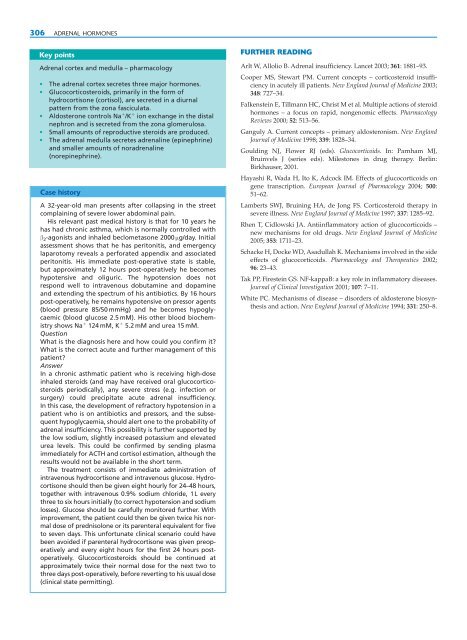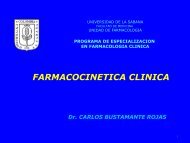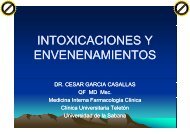Clinical Pharmacology and Therapeutics
A Textbook of Clinical Pharmacology and ... - clinicalevidence
A Textbook of Clinical Pharmacology and ... - clinicalevidence
- No tags were found...
You also want an ePaper? Increase the reach of your titles
YUMPU automatically turns print PDFs into web optimized ePapers that Google loves.
306 ADRENAL HORMONES<br />
Key points<br />
Adrenal cortex <strong>and</strong> medulla – pharmacology<br />
• The adrenal cortex secretes three major hormones.<br />
• Glucocorticosteroids, primarily in the form of<br />
hydrocortisone (cortisol), are secreted in a diurnal<br />
pattern from the zona fasciculata.<br />
• Aldosterone controls Na /K ion exchange in the distal<br />
nephron <strong>and</strong> is secreted from the zona glomerulosa.<br />
• Small amounts of reproductive steroids are produced.<br />
• The adrenal medulla secretes adrenaline (epinephrine)<br />
<strong>and</strong> smaller amounts of noradrenaline<br />
(norepinephrine).<br />
Case history<br />
A 32-year-old man presents after collapsing in the street<br />
complaining of severe lower abdominal pain.<br />
His relevant past medical history is that for 10 years he<br />
has had chronic asthma, which is normally controlled with<br />
β 2 -agonists <strong>and</strong> inhaled beclometasone 2000 μg/day. Initial<br />
assessment shows that he has peritonitis, <strong>and</strong> emergency<br />
laparotomy reveals a perforated appendix <strong>and</strong> associated<br />
peritonitis. His immediate post-operative state is stable,<br />
but approximately 12 hours post-operatively he becomes<br />
hypotensive <strong>and</strong> oliguric. The hypotension does not<br />
respond well to intravenous dobutamine <strong>and</strong> dopamine<br />
<strong>and</strong> extending the spectrum of his antibiotics. By 16 hours<br />
post-operatively, he remains hypotensive on pressor agents<br />
(blood pressure 85/50 mmHg) <strong>and</strong> he becomes hypoglycaemic<br />
(blood glucose 2.5 mM). His other blood biochemistry<br />
shows Na 124 mM, K 5.2 mM <strong>and</strong> urea 15 mM.<br />
Question<br />
What is the diagnosis here <strong>and</strong> how could you confirm it?<br />
What is the correct acute <strong>and</strong> further management of this<br />
patient?<br />
Answer<br />
In a chronic asthmatic patient who is receiving high-dose<br />
inhaled steroids (<strong>and</strong> may have received oral glucocorticosteroids<br />
periodically), any severe stress (e.g. infection or<br />
surgery) could precipitate acute adrenal insufficiency.<br />
In this case, the development of refractory hypotension in a<br />
patient who is on antibiotics <strong>and</strong> pressors, <strong>and</strong> the subsequent<br />
hypoglycaemia, should alert one to the probability of<br />
adrenal insufficiency. This possibility is further supported by<br />
the low sodium, slightly increased potassium <strong>and</strong> elevated<br />
urea levels. This could be confirmed by sending plasma<br />
immediately for ACTH <strong>and</strong> cortisol estimation, although the<br />
results would not be available in the short term.<br />
The treatment consists of immediate administration of<br />
intravenous hydrocortisone <strong>and</strong> intravenous glucose. Hydrocortisone<br />
should then be given eight hourly for 24–48 hours,<br />
together with intravenous 0.9% sodium chloride, 1L every<br />
three to six hours initially (to correct hypotension <strong>and</strong> sodium<br />
losses). Glucose should be carefully monitored further. With<br />
improvement, the patient could then be given twice his normal<br />
dose of prednisolone or its parenteral equivalent for five<br />
to seven days. This unfortunate clinical scenario could have<br />
been avoided if parenteral hydrocortisone was given preoperatively<br />
<strong>and</strong> every eight hours for the first 24 hours postoperatively.<br />
Glucocorticosteroids should be continued at<br />
approximately twice their normal dose for the next two to<br />
three days post-operatively, before reverting to his usual dose<br />
(clinical state permitting).<br />
FURTHER READING<br />
Arlt W, Allolio B. Adrenal insufficiency. Lancet 2003; 361: 1881–93.<br />
Cooper MS, Stewart PM. Current concepts – corticosteroid insufficiency<br />
in acutely ill patients. New Engl<strong>and</strong> Journal of Medicine 2003;<br />
348: 727–34.<br />
Falkenstein E, Tillmann HC, Christ M et al. Multiple actions of steroid<br />
hormones – a focus on rapid, nongenomic effects. <strong>Pharmacology</strong><br />
Reviews 2000; 52: 513–56.<br />
Ganguly A. Current concepts – primary aldosteronism. New Engl<strong>and</strong><br />
Journal of Medicine 1998; 339: 1828–34.<br />
Goulding NJ, Flower RJ (eds). Glucocorticoids. In: Parnham MJ,<br />
Bruinvels J (series eds). Milestones in drug therapy. Berlin:<br />
Birkhauser, 2001.<br />
Hayashi R, Wada H, Ito K, Adcock IM. Effects of glucocorticoids on<br />
gene transcription. European Journal of <strong>Pharmacology</strong> 2004; 500:<br />
51–62.<br />
Lamberts SWJ, Bruining HA, de Jong FS. Corticosteroid therapy in<br />
severe illness. New Engl<strong>and</strong> Journal of Medicine 1997; 337: 1285–92.<br />
Rhen T, Cidlowski JA. Antiinflammatory action of glucocorticoids –<br />
new mechanisms for old drugs. New Engl<strong>and</strong> Journal of Medicine<br />
2005; 353: 1711–23.<br />
Schacke H, Docke WD, Asadullah K. Mechanisms involved in the side<br />
effects of glucocorticoids. <strong>Pharmacology</strong> <strong>and</strong> <strong>Therapeutics</strong> 2002;<br />
96: 23–43.<br />
Tak PP, Firestein GS. NF-kappaB: a key role in inflammatory diseases.<br />
Journal of <strong>Clinical</strong> Investigation 2001; 107: 7–11.<br />
White PC. Mechanisms of disease – disorders of aldosterone biosynthesis<br />
<strong>and</strong> action. New Engl<strong>and</strong> Journal of Medicine 1994; 331: 250–8.




